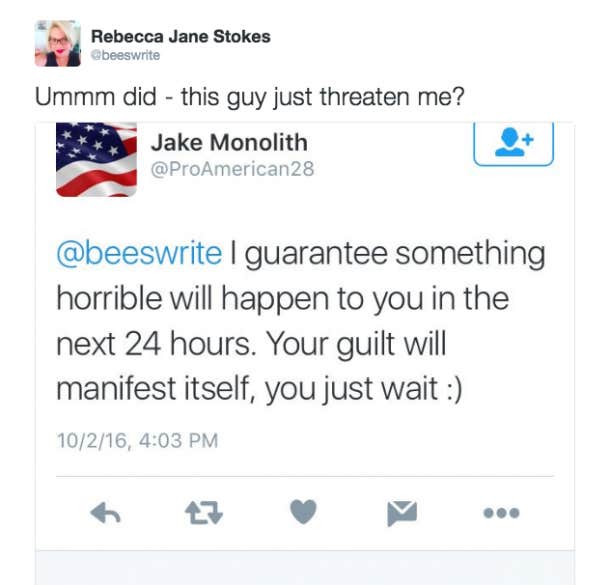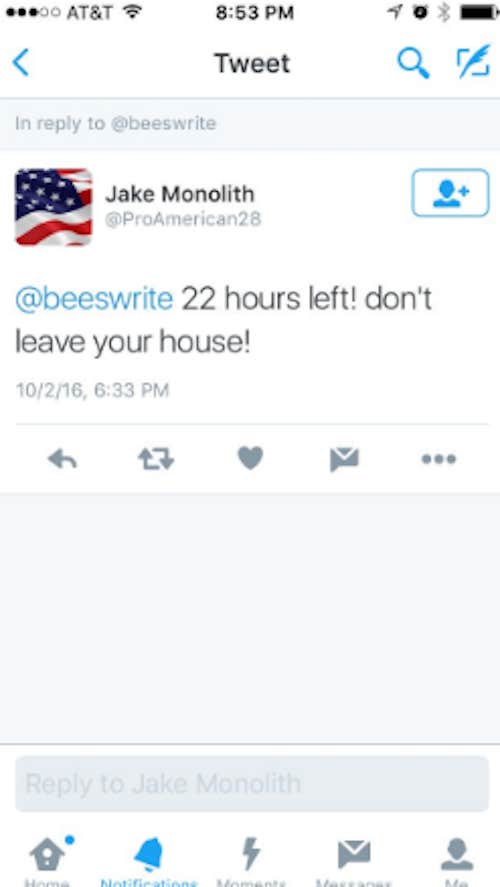I was proud of the piece, proud because I had taken a risk in my writing, and proud because, in its own small way, the piece had spoken to people who needed to hear it, other people just like me. I knew when the story went live that there would be people who thought the fat-shaming was in my head. I knew people would try to convince me that this stranger who commented on my food choices on the subway was just making small talk. I was ready for these sorts of comments. I was even excited about the opportunity to talk to people about thin privilege. I knew it would be challenging (and potentially ego-bruising), but I was prepared. But I was not prepared for my article to make someone so angry they threatened to take my life. And that’s exactly what happened. RELATED: How Medical Fatphobia Almost Killed My Friend The day after my story was published on the site, Facebook notified me that it had deactivated my account due to either bullying, inappropriate content, or pretending to be someone else. I’m still trying to get access to the account I’ve had for over a decade. There are countless photographs there, and a huge part of my work depends on interacting with the community of thousands I’ve built on Facebook. I thought it was strange, but figured it was all a misunderstanding. Then the emails started. At first, I thought someone with a name similar to mine was just confused and that’s why I was receiving email confirmations to join single-parent support groups, apply for new jobs, get a consult about plastic surgery for my nose, and confirmations to be put on the mailing list of five different funeral homes. That’s when I started to realize that maybe things weren’t just accidentally happening. Maybe someone was out to hurt me and my reputation, or at least, to make me feel like garbage. It’s not like online harassment is new. Especially for women (and many other groups of marginalized people). Just one day later, my worst fears were confirmed. I woke up to see that my Twitter notifications were double what they usually are. This was exciting, without Facebook I was in dire need of a social media fix. What I found sent my stomach ricocheting to the floor. There were the usual comments from strangers about my weight that I have learned to ignore. A man said that the reason my ex dumped me was that I was ugly and had a bad personality, and that stung. So did another where I was told to “eff off and go eat another box of cookies,” but I’ve been writing on the internet for a long time. I know an online troll when I see one. But this comment stopped me cold:
It was one in a series from an account that has since been disabled. You know, BECAUSE HE THREATENED TO KILL ME. I’ve received a lot of crap for my writing before, but I take it in stride because I believe in what I’m doing. There is, believe it or not, a method to my madness. When I write about doing something to my vagina, or about my issues with food, I know I am making people feel uncomfortable. RELATED: America’s Real Weight Problem Is The Burden We Place On Fat People That’s because we live in a society where women’s bodies are still taboo. We are supposed to keep them like dirty little secrets but at the same time, the human race depends on the amazing things women’s bodies can do. If I had to pin down my mission as a writer on the internet I would say that it is to demystify and de-stigmatize women’s bodies, and not just for men, but for ourselves. I’m ashamed of my body, too. I’m insecure, too. I am f*cked up about food, too. I am struggling just as hard as everyone else is, and I’m not going to shut up about any of it, because the only thing worse than saying the wrong thing is saying nothing at all. Then I got the second tweet two hours later:
RELATED: Teen Learns Her Mother Was The Anonymous Cyberbully Who Harassed & Catfished Her For A Year It’s not easy to stand by my beliefs on a good day, but on days when someone actively tries to dismantle my online life and threatens to end my real one, it can feel absolutely impossible. It’s awful having your boyfriend read through comments calling you fat, ugly, and crazy trying to sort out the awful people from the potentially harmful ones. It’s awful having to let your closest friends know what’s going on because you’ll be home alone tonight and want someone to know, just in case. It’s awful having to explain to your mom, no, you didn’t block her on Facebook, a man got angry because you talked about being fat and decided that you don’t deserve friends, you don’t deserve to live. Raise your hand if you got a text from your mom today that read “alive?” Because I did. I know that the chances are high that this is just one, persistent, awful, tech-savvy troll at work. But that doesn’t mean I wasn’t so scared by this online harassment that I canceled plans to leave my house today. I have no intention of living my life in fear, but I will have to change my email addresses, and all of my passwords, look over my shoulder more than I’d like, and, perhaps hardest of all, get an actual person on Facebook to reactivate my account. When I moved to New York ten years ago, it was to pursue my MFA in playwriting. This whole “internet writing” thing was just supposed to cover my bills. But now it’s who I am. It’s here talking with you all that I have found my voice, and that voice won’t be silenced by anyone. RELATED: I’m Showing My “Fat” Belly To The World To Make An Important Point Rebecca Jane Stokes is a writer and the former Senior Editor of Pop Culture at Newsweek with a passion for lifestyle, geek news, and true crime.

